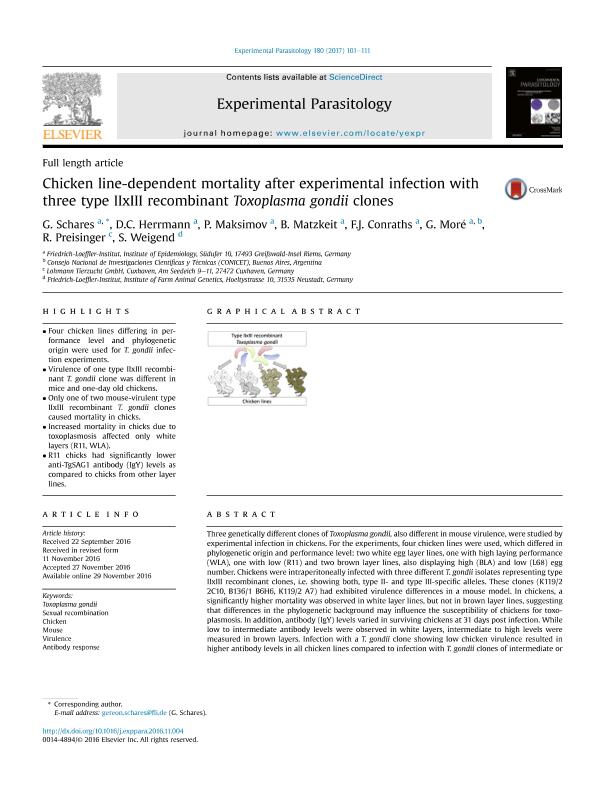Mostrar el registro sencillo del ítem
dc.contributor.author
Schares, G.
dc.contributor.author
Herrmann, D. C.
dc.contributor.author
Maksimov, P.
dc.contributor.author
Matzkeit, B.
dc.contributor.author
Conraths, F.J.
dc.contributor.author
Moré, Gastón Andrés

dc.contributor.author
Preisinger, R.
dc.contributor.author
Weigend, S.
dc.date.available
2018-06-22T18:55:41Z
dc.date.issued
2017-09
dc.identifier.citation
Schares, G.; Herrmann, D. C.; Maksimov, P.; Matzkeit, B.; Conraths, F.J.; et al.; Chicken line-dependent mortality after experimental infection with three type IIxIII recombinant Toxoplasma gondii clones; Academic Press Inc Elsevier Science; Experimental Parasitology; 180; 9-2017; 101-111
dc.identifier.issn
0014-4894
dc.identifier.uri
http://hdl.handle.net/11336/49704
dc.description.abstract
Three genetically different clones of Toxoplasma gondii, also different in mouse virulence, were studied by experimental infection in chickens. For the experiments, four chicken lines were used, which differed in phylogenetic origin and performance level: two white egg layer lines, one with high laying performance (WLA), one with low (R11) and two brown layer lines, also displaying high (BLA) and low (L68) egg number. Chickens were intraperitoneally infected with three different T. gondii isolates representing type IIxIII recombinant clones, i.e. showing both, type II- and type III-specific alleles. These clones (K119/2 2C10, B136/1 B6H6, K119/2 A7) had exhibited virulence differences in a mouse model. In chickens, a significantly higher mortality was observed in white layer lines, but not in brown layer lines, suggesting that differences in the phylogenetic background may influence the susceptibility of chickens for toxoplasmosis. In addition, antibody (IgY) levels varied in surviving chickens at 31 days post infection. While low to intermediate antibody levels were observed in white layers, intermediate to high levels were measured in brown layers. Infection with a T. gondii clone showing low chicken virulence resulted in higher antibody levels in all chicken lines compared to infection with T. gondii clones of intermediate or high chicken virulence. This was in agreement with the parasite load as determined by real-time PCR. Overall, results show that progeny resulting from natural sexual recombination of T. gondii clonal lineages, may differ in their virulence for mice and chickens.
dc.format
application/pdf
dc.language.iso
eng
dc.publisher
Academic Press Inc Elsevier Science

dc.rights
info:eu-repo/semantics/openAccess
dc.rights.uri
https://creativecommons.org/licenses/by-nc-nd/2.5/ar/
dc.subject
Antibody Response
dc.subject
Chicken
dc.subject
Mouse
dc.subject
Sexual Recombination
dc.subject
Toxoplasma Gondii
dc.subject
Virulence
dc.subject.classification
Otras Ciencias Veterinarias

dc.subject.classification
Ciencias Veterinarias

dc.subject.classification
CIENCIAS AGRÍCOLAS

dc.title
Chicken line-dependent mortality after experimental infection with three type IIxIII recombinant Toxoplasma gondii clones
dc.type
info:eu-repo/semantics/article
dc.type
info:ar-repo/semantics/artículo
dc.type
info:eu-repo/semantics/publishedVersion
dc.date.updated
2018-06-22T15:05:38Z
dc.journal.volume
180
dc.journal.pagination
101-111
dc.journal.pais
Estados Unidos

dc.description.fil
Fil: Schares, G.. Friedrich Loeffler Institut; Alemania
dc.description.fil
Fil: Herrmann, D. C.. Friedrich Loeffler Institut; Alemania
dc.description.fil
Fil: Maksimov, P.. Friedrich Loeffler Institut; Alemania
dc.description.fil
Fil: Matzkeit, B.. Friedrich Loeffler Institut; Alemania
dc.description.fil
Fil: Conraths, F.J.. Friedrich Loeffler Institut; Alemania
dc.description.fil
Fil: Moré, Gastón Andrés. Friedrich Loeffler Institut; Alemania. Consejo Nacional de Investigaciones Científicas y Técnicas; Argentina
dc.description.fil
Fil: Preisinger, R.. Lohmann Tierzucht; Alemania
dc.description.fil
Fil: Weigend, S.. Friedrich Loeffler Institut; Alemania
dc.journal.title
Experimental Parasitology

dc.relation.alternativeid
info:eu-repo/semantics/altIdentifier/doi/http://dx.doi.org/10.1016/j.exppara.2016.11.004
dc.relation.alternativeid
info:eu-repo/semantics/altIdentifier/url/https://www.sciencedirect.com/science/article/pii/S0014489416303496
Archivos asociados
